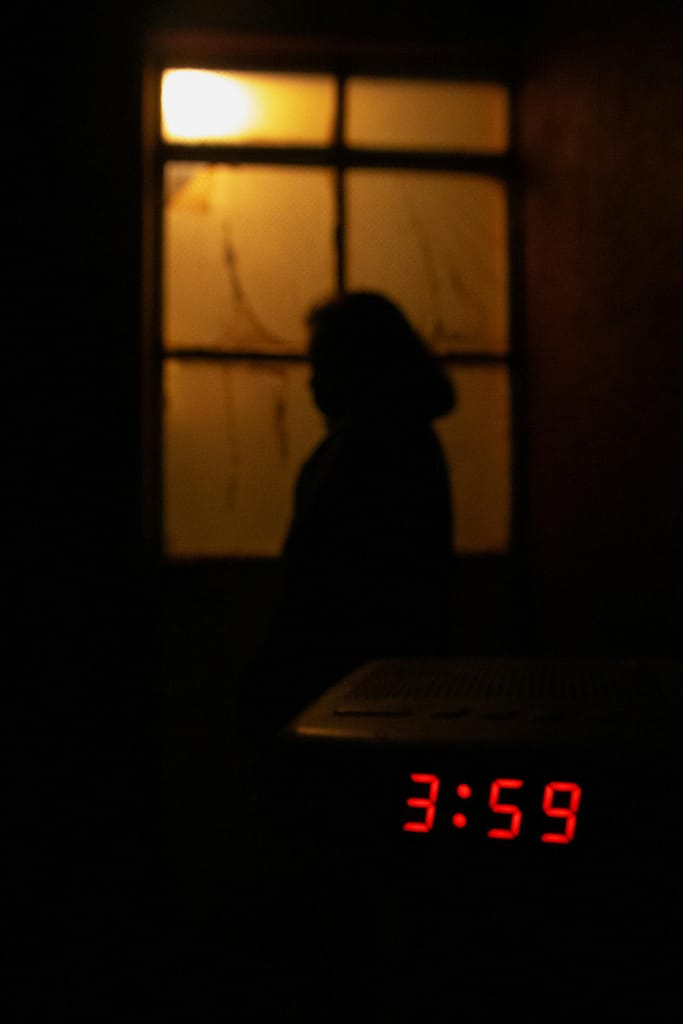Why Does Anxiety Get Worse at Night? The Quiet Truth That No One Talks About
Why does it always seem like anxiety gets worse when the world finally quiets down? You’re lying in bed, hoping for sleep, but instead, your mind is racing, your heart is pounding, and the weight of the day feels heavier than ever. If this sounds familiar, you’re not alone. This is nighttime anxiety, and it has a way of creeping in when you’re least prepared for it.
Table of Contents
Many people find themselves asking, “Why does anxiety get worse at night?” The answer isn’t that simple, as you may expect a sudden answer right now at 2 a.m. Nighttime strips away the distractions of the day, leaving us face-to-face with our thoughts and worries. In this article, we’ll explore why anxiety tends to intensify at night and how it’s deeply connected to the mind and body. Later one, I will tell you my personal story, how I used the tecniques I will mention for coping with anxiety, and took major life changes.
The Science Behind Nighttime Anxiety
So, why does anxiety get worse at night?
Because the world softens, but your thoughts don’t.
During the day, there’s noise—tasks to complete, people to answer, distractions to numb the hum beneath your skin. But when night falls and the silence stretches wide, the mind finally has room to speak. And it doesn’t always whisper—it echoes.
Biologically, there’s more to the story. As your body prepares for sleep, cortisol—the stress hormone—dips to make room for rest. But that dip also leaves you more exposed. A small spike in adrenaline can now feel like a storm. Your heart may race, your breath might shorten, and suddenly, you’re spiraling.
This is why anxiety gets worse at night—because in the quiet, both your biology and your thoughts rise up, unfiltered.
The Link Between Nighttime Anxiety and Mental Health
But why does anxiety get worse at night for so many of us? Because it’s not just about the dark. It’s about everything the dark reveals. Nighttime anxiety rarely arrives uninvited—it’s often tethered to deeper mental health wounds. If you’ve ever felt that quiet ache of being depressed at night time, you understand. Silence doesn’t soothe—it magnifies. It wraps around your fears like a heavy blanket, pressing you into the mattress with thoughts too loud to ignore.
And then there’s sleep—fragile, elusive. Insomnia creeps in, hand in hand with racing thoughts. You lie awake, heart thudding, staring at the ceiling while panic stirs just beneath your skin. Nighttime anxiety symptoms—like waking up breathless, struggling to fall asleep, or that sudden surge of dread—become your unwanted ritual. The less rest you get, the more your body forgets how to feel safe. The more anxious you feel, the harder it is to surrender to sleep. It’s a cruel loop. And without naming it for what it is, you stay caught in the spiral.

If your mind spins the moment your head hits the pillow, explore why does anxiety get worse at night and how racing thoughts might be fueling it here.
Breaking the Cycle of Nighttime Anxiety
I know you’ve read the guides. Tried the tricks. If you’ve landed here, it’s not because you need another recycled tip—you’re here because nothing is working. And maybe… that’s your sign to do something radical.
When anxiety at night becomes routine, it feeds on repetition. So stop playing by the same rules. It’s time to break the pattern.
Here are some bold, even ridiculous ideas. But I beg you—don’t dismiss them. Sit with them. One of them might be the reset your soul is aching for.
A. Sleep Somewhere Else
If your bed feels like a battlefield, leave it. Anxiety has a way of attaching itself to familiar spaces. Change the scenery. Sleep on the couch, on the floor with a soft blanket, or in a different room entirely.
In my early years, I found solace on the floor, wrapped in a weighted blanket, far from the expectations of my own bed. It felt strange—but also strangely safe. A cocoon. A clean slate.
Feeling daring? Try outside. Sleep beneath the stars, let the night sky hold you. There’s something healing in the vastness above and the fresh air brushing against your skin.
B. Overhaul Your Evenings Entirely
Ask yourself: Is your nighttime routine helping—or hurting?
If it’s not helping, burn it down. Start over.
Instead of trying to relax with a book, dance like a wild thing to loud music for 10 minutes. Exhaust the tension that feeds nighttime anxiety symptoms. Then, breathe. Let your body collapse into stillness, like a wave finally meeting the shore.
Instead of scrolling through your phone, try something uncomfortable but healing: stand in front of a mirror and say out loud, “I am safe. I am enough. I will survive this.” It might feel awkward. Do it anyway.
C. Rearrange Your Entire Space
If your bedroom feels like it traps you, transform it.
Move your bed. Declutter every corner. Remove anything that carries old energy or weight. Repaint your walls in a calming hue—soft sage, misty blue, or rose quartz.
Add fairy lights, hang gauzy curtains, or create a canopy. Build a cocoon. Let your space feel like a new chapter, not a repeat of every anxious night before.
D. Treat Your Anxiety Like a Puzzle
When nighttime anxiety hits, don’t fight it—face it.
Get out of bed. Sit somewhere still, warm, and dimly lit. Then ask:
What exactly am I afraid of right now?
Is this fear real, or just the dark playing tricks on me?
What would I say to a friend who feels like this?
Write it down. Dissect it. Let the act of confronting it lessen its grip. Treat your fear like a puzzle to be solved, not a monster to be feared.
Because sometimes, clarity comes not from fighting the night—but from learning to sit with it.

Struggling with anxious nights and a foggy mind the next day? Learn how alcohol might be making it worse and explore the connection between alcohol, brain fog, and why does anxiety get worse at night in this article.
E. Get Extreme with Your Body
When the question keeps circling in your mind—why does anxiety get worse at night—sometimes the only answer is action. If your body feels restless, give it a new sensation to anchor to.
Start with contrast.
Take an ice-cold shower. The jolt can short-circuit spiraling thoughts and help reset your nervous system. That rush of cold isn’t just shocking—it’s grounding. It reminds your brain that you’re here, you’re alive, and you’re in control.
Not into extremes? Go the other way.
Take a long, hot bath in absolute silence. Let your body melt into the warmth. Submerge yourself fully and imagine the water washing your anxiety away. Let your breath slow. Let your muscles forget how to hold tension.
Disclaimer: As a physician, I don’t recommend practicing extreme temperature exposure for more than five minutes without consulting your doctor. Listen to your body. Always.
F. Make a Drastic Lifestyle Shift
Sometimes, when you’re asking why does anxiety get worse at night, the answer isn’t just about the night. It’s about your life.
Ask the uncomfortable questions:
Am I living the life I actually want?
Is my job destroying me slowly?
Is this relationship nourishing or draining?
Am I surrounded by chaos when I crave calm?
I’ve been there. I’ve asked those same questions, and I made painful but powerful changes—one at a time. Your healing won’t happen overnight, but the decision to take that first step can.
So take it. Restructure your days if your nights are falling apart.
G. Embrace the Darkness
Instead of resisting the night, lean into it. Turn off every light. Let yourself lie there, not to fight the fear, but to feel the stillness. The darkness isn’t your enemy—it’s a container. A place where nothing is required of you.
Sink into it like a warm blanket. Let it hold you.
If it feels like too much, light a single candle. Watch it flicker. Let its quiet flame be your anchor. Let it remind you that even in the dark, something soft and steady still glows.
Because even if anxiety gets worse at night, your strength does not disappear with the sun.
You are not broken. You are becoming.

If your nights feel haunted by fear or confusion, you’re not alone in wondering why does anxiety get worse at night. Sometimes, it even takes the form of sleep paralysis. Learn more about this eerie experience and whether it’s truly dangerous in this article.
Still wondering why does anxiety get worse at night? Sometimes, it’s because your brain refuses to power down. The silence becomes too loud, the dark too heavy. That’s when tools like this multi-mode cranial therapy device step in—not to drown out your thoughts, but to gently steer them toward stillness.
Designed for migraines, insomnia, and sensory overload, it helps calm overstimulation at its root. I like to think of it as a whisper to the nervous system—reminding it that safety isn’t something you have to chase. It’s already here. If your nights feel like a battlefield, this might be the gentle armor you need.
The Day I Chose Myself: A Story of Change and Courage
There comes a moment when staying the same becomes more painful than the fear of change. For me, that moment arrived quietly—after years of enduring what I can only describe as psychological warfare at work.
Every day felt like a slow unraveling. Not just from the impossible deadlines or the constant pressure, but from the way I was made to feel—like I was never enough. Criticism came wrapped in fake smiles. My effort was invisible. My burnout? I wore it like makeup.
I told myself, “This is normal. Everyone feels this way.”
But it wasn’t normal.
It was a slow and brutal erasure of my joy, my peace, and the version of me I used to love.
Then one evening, I stood in my kitchen—barefoot, exhausted, blinking back tears. I cried on the cold counter, admitting what I hadn’t been brave enough to say out loud: “I can’t do this anymore.”
Quitting a toxic job isn’t noble—it’s terrifying.
The what ifs are ruthless: What if I regret it? What if I can’t find better? What if this is the best it gets?
But the bigger question whispered back: What if this is the moment everything changes?
I walked into my boss’s office the next morning, heart racing, words rehearsed. But before I could speak, he looked at me and said, “I won’t be renewing your contract.”
And just like that, the universe moved for me.
One day later, I had a new offer in my inbox—better hours, a peaceful team, a job that didn’t make me dread the sound of my alarm.
But it didn’t stop there.
I had lived in the same apartment for years. I didn’t love it—but I knew it. I had memorized every creak in the floor, every crack in the walls. It was familiar… and suffocating.
I saw a listing, called the broker on a whim, and the next day, I stood in a sunlit room that felt like mine. I made an offer the same afternoon. I didn’t ask anyone’s permission. I didn’t make a pro-con list. I just knew.
And that’s the thing about change. When it’s time, your soul already knows.
Moving wasn’t just about four new walls.
It was about breathing again.
It was about sleeping again.
It was about letting go of a life that made me ask why does anxiety get worse at night—and finally choosing one that let me rest.

A Different Kind of Calm for When Nothing Else Works
When you’re deep in it—when the room is dark, your chest is tight, and your thoughts are louder than ever—that’s when anxiety shows its sharpest edge. And if you’ve tried everything, from guided meditations to warm baths, but your nights still feel unbearable, it might be time to try something new.
This sound therapy and near-infrared headband was made for nights just like these. It calms your brain through gentle pulses and healing light—helping ease the symptoms of what can feel like incurable insomnia. If you’ve ever wondered why anxiety gets worse at night, maybe it’s not your mind—it’s the patterns you’ve been trapped in. And maybe this is your first step out.
If you’re still asking why does anxiety get worse at night, maybe the answer isn’t just in your mind—but in your body’s disconnection from the earth itself. At night, we’re more still, more exposed to the hum of our own nervous system. That’s where grounding steps in—not as a trendy fix, but as a quiet return to balance.
This grounding mat taps into the healing power of the Earth’s energy. It’s not magic. It’s science—and calm. Slip it under your feet or beneath your body while you sleep, and feel the static of stress slowly discharge. When nothing else calms the storm, this might be the stillness your nights have been missing.
What I Learned
Changing your life isn’t easy. Most of the time, it doesn’t look like a movie montage—it’s messy, terrifying, and full of second-guessing. But sometimes, all it takes is a small nudge. A moment where the ache of staying the same outweighs the fear of what comes next.
Today, I wake up in a space that feels like a hug.
I go to work without dread clinging to my chest.
And while life still throws its curveballs, it finally feels like mine.
If you’re here, reading this and feeling stuck, let me say this plainly:
It’s okay to start over.
It’s okay to walk away from what breaks you.
And it’s more than okay to run toward what lights you up inside.
Because sometimes, the life you’ve been quietly wishing for is waiting—just beyond the fear.
If you’re wondering why you feel so worn down, start by exploring the signs of chronic sleep deprivation and what it’s doing to your mind and body.
Like and follow us on our Facebook Page







